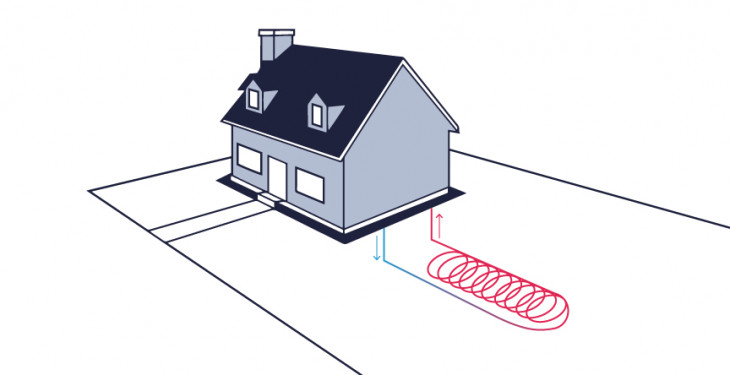

Written by Stephen Day
Gas Safe Engineer
Updated: 3rd November, 2025
Heat pumps are an extremely popular topic of conversation amongst homeowners and heating industry experts alike, hailed as the future of heating by some, and disregarded by others.
In this blog we will be exploring ground source heat pumps, how they operate and some of their prices.
In case you’re not completely sure, a ground source heat pump (sometimes called a ground to water heat pump), transfers heat from the ground outside of a property to heat the radiators and underfloor heating within a property.
These types of heat pumps work by utilising a pipe loop in the garden (either long or coiled in trenches) that contains TTF (thermal transfer fluid) to absorb heat from the ground, which is then passed through a heat exchanger and into the heat pump, the temperature of the fluid is raised and the heat is then transferred to the properties circulation of water supply.

The unit cost and installation fees for a ground source heat pump can vary widely and are often dependent on a number of factors including
The brand, model and size of the ground source heat pump you wish yo install
Access to the ground and whether you choose the trenching option or a borehole to lay the ground loop
The size of the property and its heating demands
Whether the property is a new-build or existing home structure
The heat pump’s efficiency, or if the radiators/underfloor heating choices are being installed for the first time
Often, ground source heat pumps can cost around £24,000 for a ground loop buried in trenches, and up to £49,000 if your installation site requires a borehole!
While these prices seem incredibly steep, we strongly advise attaining numerous work quotes for this type of job before committing to any one price.
The potential for savings to be made with the utilisation of a ground source heat pump according to the data can be fruitful, however would also depend on the design and functionality of the heat pump itself while being compared to the heating system it is replacing. Other factors that can determine the amount of money you could potentially save include:
What current fuel you use and how much it costs
How much your electricity tariff costs
The efficiency of the new pump
Layout of current central heating system
Your location and its average air or ground temperature
While a heat pump requires a compressor which needs electricity to function, they use less than the amount of heat they move from outside to the inside.
Unless particular attention is paid to the efficiency of any new installation, traditional gas fuel users could end up paying marginally more to operate a ground source heat pump than LPG users.
We predict that the costs of heat pumps in terms of fuel usage will become the cheapest over time as well as the lowest carbon form of heating on the market.
Yes, as of April 2022, the government introduced the boiler upgrade scheme, this £450million initiative comes as part of the Heat and Buildings Strategy that offers a £6,000 reduction of the supply and installation of a ground source heat pump for property owners in England and Wales.
Another grant is the Energy Company Obligation (ECO), which imposes a legal obligation on energy suppliers to promote and enable energy efficient actions such as the installation of ground source heat pumps.
The final way you could get a cost reduction on a heat pump is via the VAT charges, if you’re over 60 or receive income or disability benefits, you could receive a 5% tax reduction for either the whole product or installation.

Here at iHeat, we stock a massive range of the newest and most advanced home heating systems, including sleek and efficient combi boilers.
With an online free quote, fixed price guarantee and next day installation available, now might be the perfect time to upgrade your home’s heating system.
Get a quote in 60 seconds, fitted as fast as next day!
0% APR finance available.
Last updated: 3rd November, 2025

Written by Stephen Day
Gas Safe Engineer at iHeat
Stephen Day is a Gas Safe registered and FGAS certified engineer with over 20 years of hands-on experience in the heating, cooling, and renewable energy industry, specialising in boiler installations, air conditioning, and heat pump systems.
LinkedInArticles by Stephen Day are reviewed by iHeat’s technical team to ensure accuracy and reliability.

06th February, 2026
Retrofitting a heat pump replaces or supplements traditional heating methods with modern,...
 Read Article
Read Article

06th February, 2026
Heat pumps have an average lifespan of about 15 to 25 years depending on care, usage, and...
 Read Article
Read Article

06th February, 2026
As homeowners seek sustainable and cost-effective heating solutions, understanding the mec...
 Read Article
Read Article
No obligation. Takes less than 60 seconds.